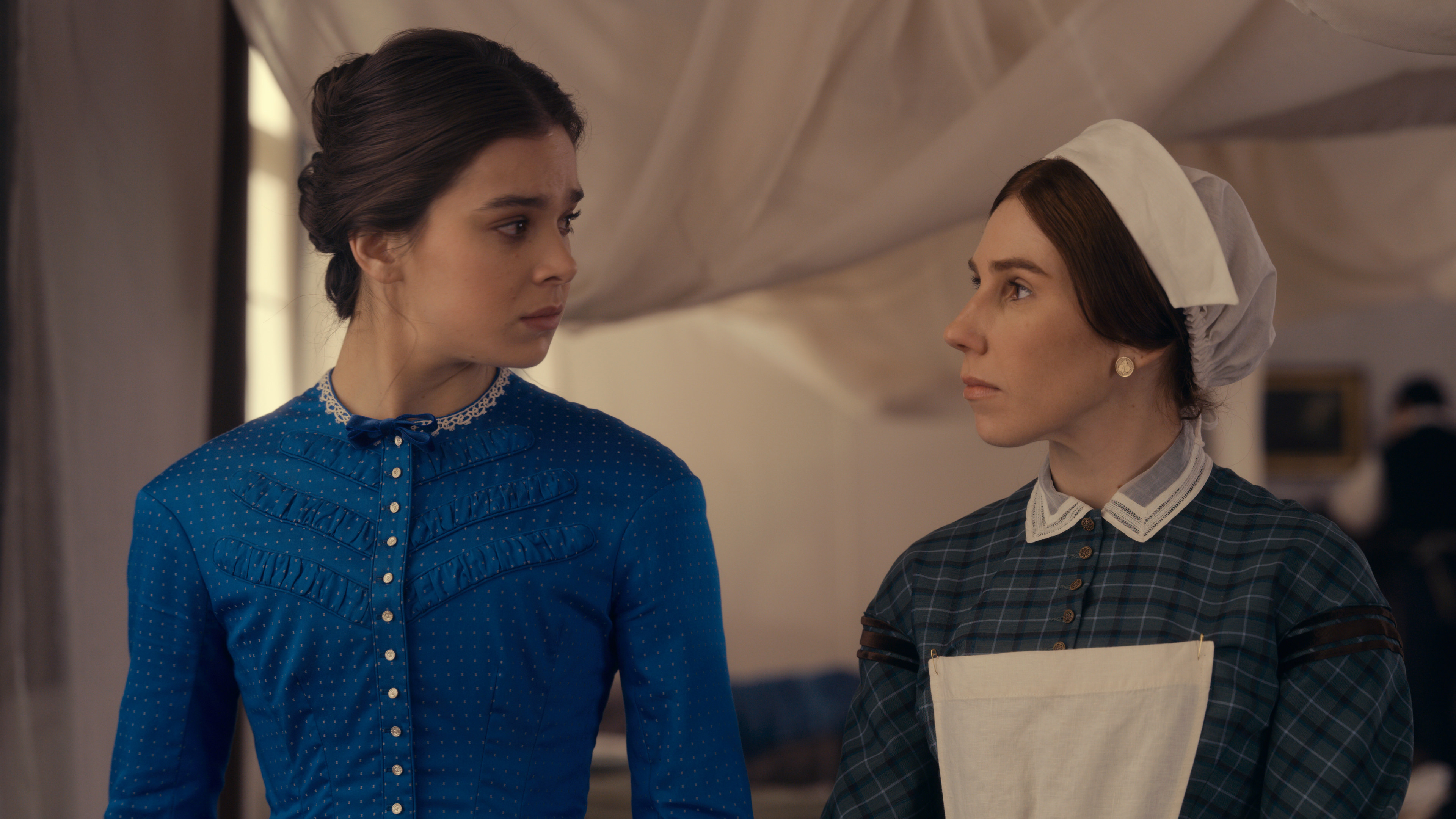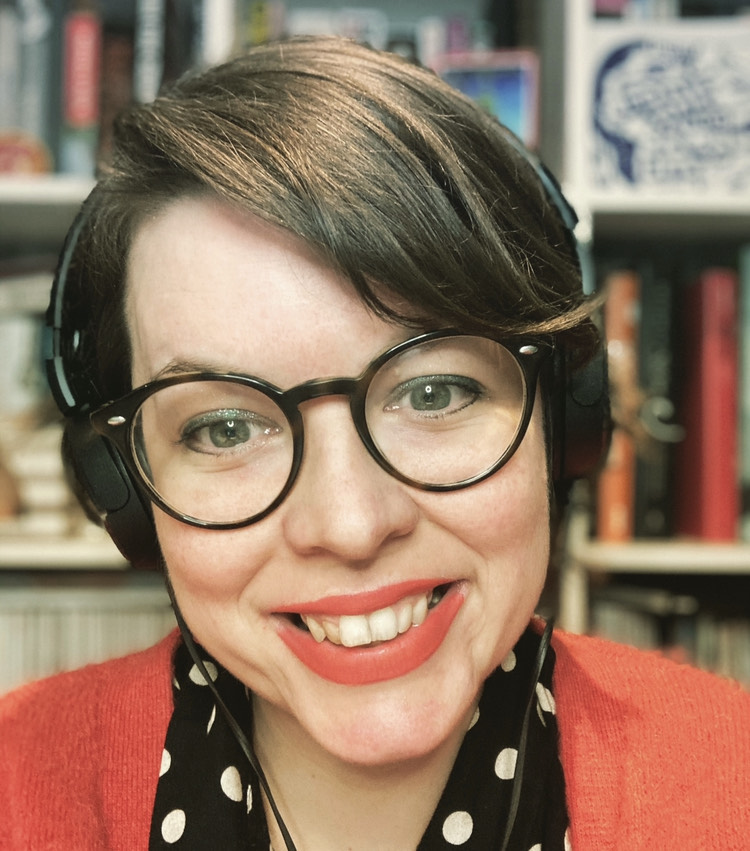What to Watch Verdict
The balance of fantasy and reality is a 'Dickinson' strength as this episode proves.
Pros
- +
Mail is an effective thread that connects the stories
- +
Austin's vulnerability rather than petulance
- +
Guest stars Billy Eichner, Zosia Mamet and Beth Ditto
- +
Costume designer Jennifer Moeller's stunning looks in Pfaff's beer cellar
- +
Fleshing out Henry's storyline
Cons
- -
Vinnie's appearance is hilarious but too brief
This post contains spoilers for the Dickinson episode "This is my letter to the World." Read our latest review here.
The printing press and the newspaper industry were employed in Dickinson season 2 to illustrate the power of the written word. It isn’t only Emily (Hailee Steinfeld) who looked to harness this technology, as Henry’s (Chinaza Uche) abolitionist publication, The Constellation, also utilized this method of getting the message out — while raising funds for John Brown’s rebellion. Now Henry and Emily are linked once more by penmanship, even if neither of them is aware of the connection shared via Thomas Wentworth Higginson (Gabriel Ebert). The young poet feels disconnected from the events tearing the country apart but little does she know how close to home the war actually is.
Emily’s first flush with fame in the hallowed Springfield Republican provided the opportunity to show the mechanics behind daily newspaper production and its distribution in Amherst. It is a short sequence but one that drives at the many moving parts, which is similar to the opening of “This Is My Letter to the World.” What separates the two is Emily’s message is only being sent to one person, and yet this letter will have a wide-reaching impact on her legacy.
“I enclose my name — asking you, if you please — sir. To tell me what is true?” are words taken directly from her first letter to Higginson that fill the screen as if one of her poems.
Mail is an important source of communication in a divided country and it is no surprise that a letter to Edward Dickinson (Toby Huss) from his brother in the South is viewed with derision. The postman doesn’t hold it against Emily though, as he gladly takes her post that will end up on the front line.
The letter and Henry both arrive in Higginson’s office at the same time and we learn it is The Constellation that has led to this job opportunity. From the jump, Higginson is a well-meaning white ally but with a heavy dollop of cringe. He keeps calling Henry “my brother,” offers an awkward fist bump and says things like “there I go centering whiteness again.”
The men of the First South Carolina Volunteers are former slaves who are an infantry regiment without guns. They cannot pick up arms until Lincoln signs the Emancipation Proclamation because of red tape, which makes their active fighting role a catch-22. This group of men is recognized as the first Black unit of the Union Army and Henry’s job is to teach them to read and write. Of course, education is important but the whole endeavor feels pretty backwards considering the fraught landscape. The men quickly make their grievances known — including the lack of pay, supplies, and decent food.
The latest updates, reviews and unmissable series to watch and more!
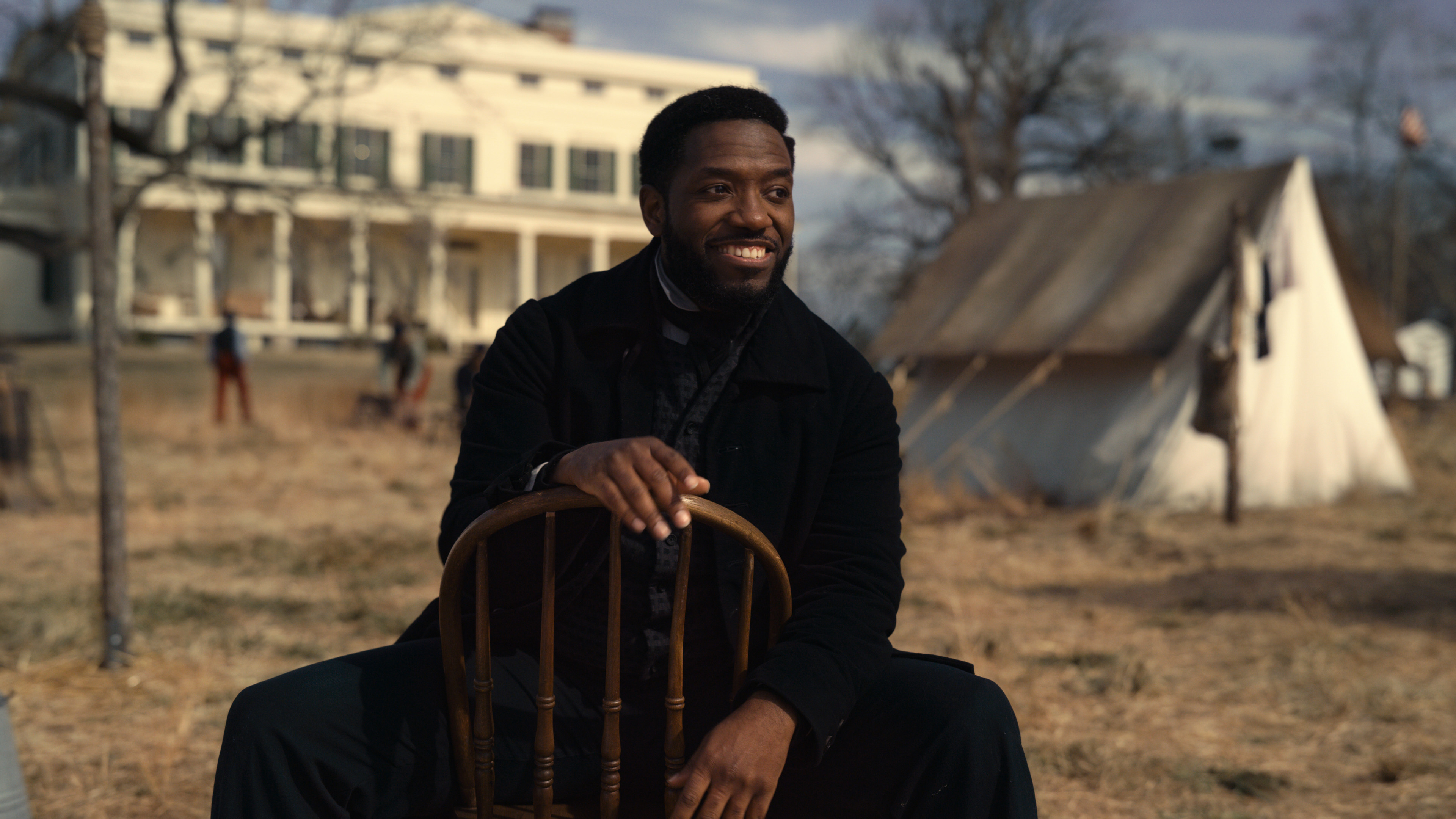
After spending the majority of the first three episodes in New England, “This Is My Letter to the World” reveals the scope of season 3 and how it isn’t only going to be Emily’s point of view. To her, Higginson is a bastion of hope and knowledge, whereas, for Henry, the reality is someone that says he wants to enact change but is hampered by bureaucracy. As a free man, Henry’s experience makes him open to light-hearted teasing about his accent and where he has come from. He tells the men he will talk to Higginson about getting them weapons but he is also limited. We also know he is still not writing to Betty (Amanda Warren), or rather, he isn’t sending the letters to his wife and daughter.
These men are “fighting for ourselves,” and this comment illustrates that while it is one American Civil War, the cost is very different. The latter is emphasized further in the following scene when Edward grumbles his brother’s plantation was ransacked by Union soldiers. He can’t help but both sides the conflict and there is a big difference between the right to live with liberty than property damage.
Edward’s desire to stay in contact with his brother is understandable, however, his inability to view this war through the bigger picture is only going to cause more strife. Mrs. Dickinson (Jane Krakowski) is already pondering how this correspondence will be viewed by their neighbors and the itching that follows feels like an omen — even if Maggie’s (Darlene Hunt) theory that their predicament has been caused by elves turns out to be incorrect.
Rather, the source is Vinnie (Anna Baryshnikov) and her ongoing attempt to feel connected to the trauma of the fallen soldiers. She has buried herself alive and also slept in the barn, and the latter is where a flea infestation has come from. With each episode, Vinnie is increasingly dialing up the performance art and my only criticism is her late and all-too-brief appearance. Hats off to the costume, hair and makeup team (as well as Baryshnikov) because she really is working the terrifying mud look.
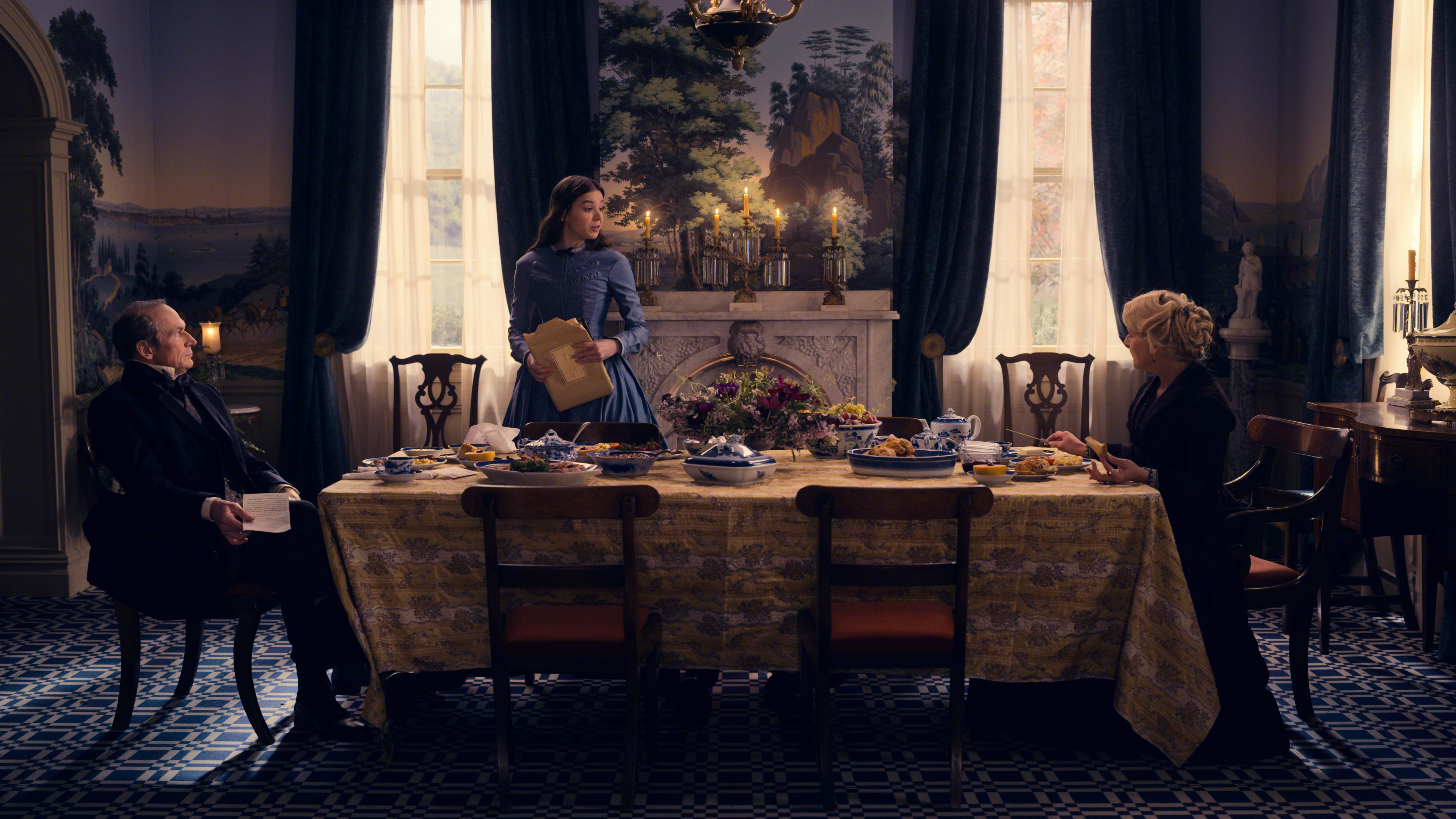
Somehow, Emily has been sparred the fleas thanks to her date with Walt Whitman in her botanical hideaway. She has a copy of the controversial (for the time) Leaves of Grass and it is not the first time the poet has sought counsel from other writers. It is also worth pointing out that one critic of this collection was Thomas Wentworth Higginson who snarked, "It is no discredit to Walt Whitman that he wrote Leaves of Grass, only that he did not burn it afterwards."
Emily feels quite the opposite and she is hoping to find some answers to the conundrum that has been rattling around her brain. Last week, Betty questioned her ability to capture the messiness of the world if she cannot confront it, so she is seeking a connection to the trauma of this war. While Emily doesn’t physically leave Amherst in this episode, she takes a pivotal trip to New York City to meet the poet as a result of her afternoon reading — Impeachment: American Crime Story viewers will doubt know this is Bill Clinton’s favorite book.
Considering they were alive at the same time and Whitman is considered one of America’s most influential poets (if not the most influential) it is no surprise to see him appear in Emily’s world. Casting a comic actor in the role of a famous literary is a Dickinson signature and Billy Eichner takes on this mantle with much gusto and enthusiasm. It is an inspired choice and his energy as this fantasy version is the boost Emily needs.
Everything he says is with the same booming joie de vivre intonation whether “I am New York” or “pain is everywhere.” It is his belief that as a writer you are everyone and there is an element of letting go that Emily doesn’t quite grasp until the bar scenes later in the episode. The jazz score accompanying these scenes adds to the frenzy of these conversations and Walt’s free-thinking dialogue.
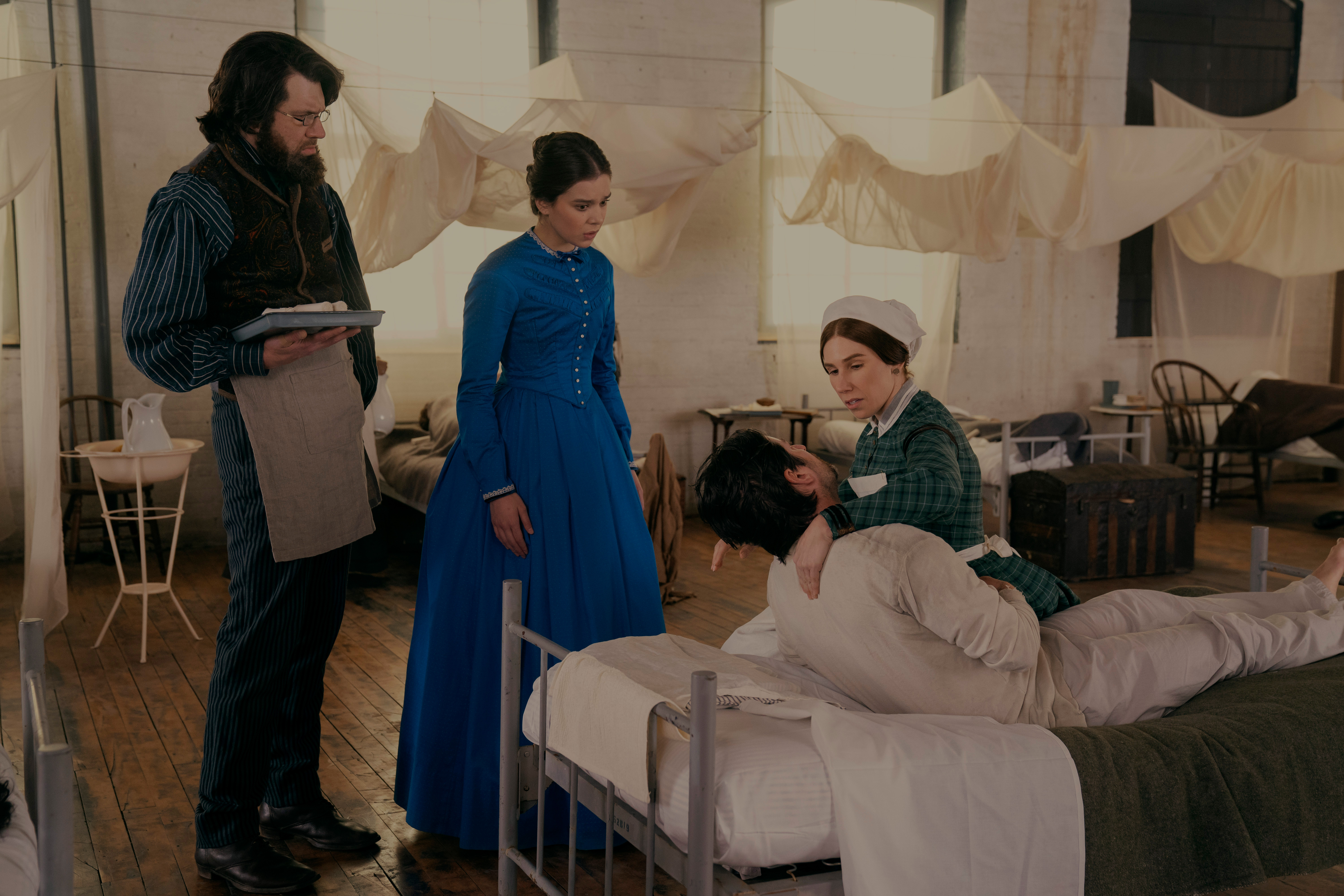
Walt is not the only writer Emily encounters in this vivid fantasy. Because this show deftly walks the line it is easy to forget that Emily isn’t really in the Big Apple. Louisa May Alcott (Zosia Mamet) is on hand to aid the suffering and notes that her time as a Civil War nurse is “Yet another surprising but legitimate fact about me.” She also mentions the great material she is getting for her work and unlike Walt (who is preoccupied with emotions), Louisa is focused on specificity and detail — she knows death sells. Her observations linger on the smell of a wound rather than what someone is feeling when they are about to meet death. Mamet steals every moment of her guest appearance and her dry delivery makes her return a very welcome one.
In reality, Walt Whitman visited the wounded in a New York City hospital and it wasn’t until he traveled to Fredericksburg, Va., that he became a nurse (he later worked as a Civil War nurse in Washington, D.C.). He wrote about his experience in poems like “The Wound-Dresser,” but his time with Emily is focused on getting her to “stop trying to understand.” Instead, Emily needs to just give in to her feelings and in this case, it is what (or rather who) turns her on that ends up preoccupying this fantasy. Her journey with Walt takes her to the legendary Pfaff’s beer cellar that was a haven for the literary community and one of New York’s earliest LGBTQ drinking venues. "New York is back" yells Walt reminding us of the links to the present and the last 18-plus months.
Situated in Greenwich Village, Pfaff’s was one of Whitman’s favorite hangouts and a hotbed of bohemian activity. In the world of Dickinson, this joy-filled venue has an anything-goes atmosphere, in which the waiters don’t wear pants beneath their aprons and the dress code is just as unrestrictive. Beth Ditto guest stars as a singer decked out in mermaid finest and costume designer Jennifer Moeller has crafted an ornate ensemble that is hard to take your eyes off. Another costume detail to take note of is how Emily’s dress changes from a muted blue polka dot to a more vibrant shade in this vision, which reminds us of the dreamlike world and Emily’s emboldened state.
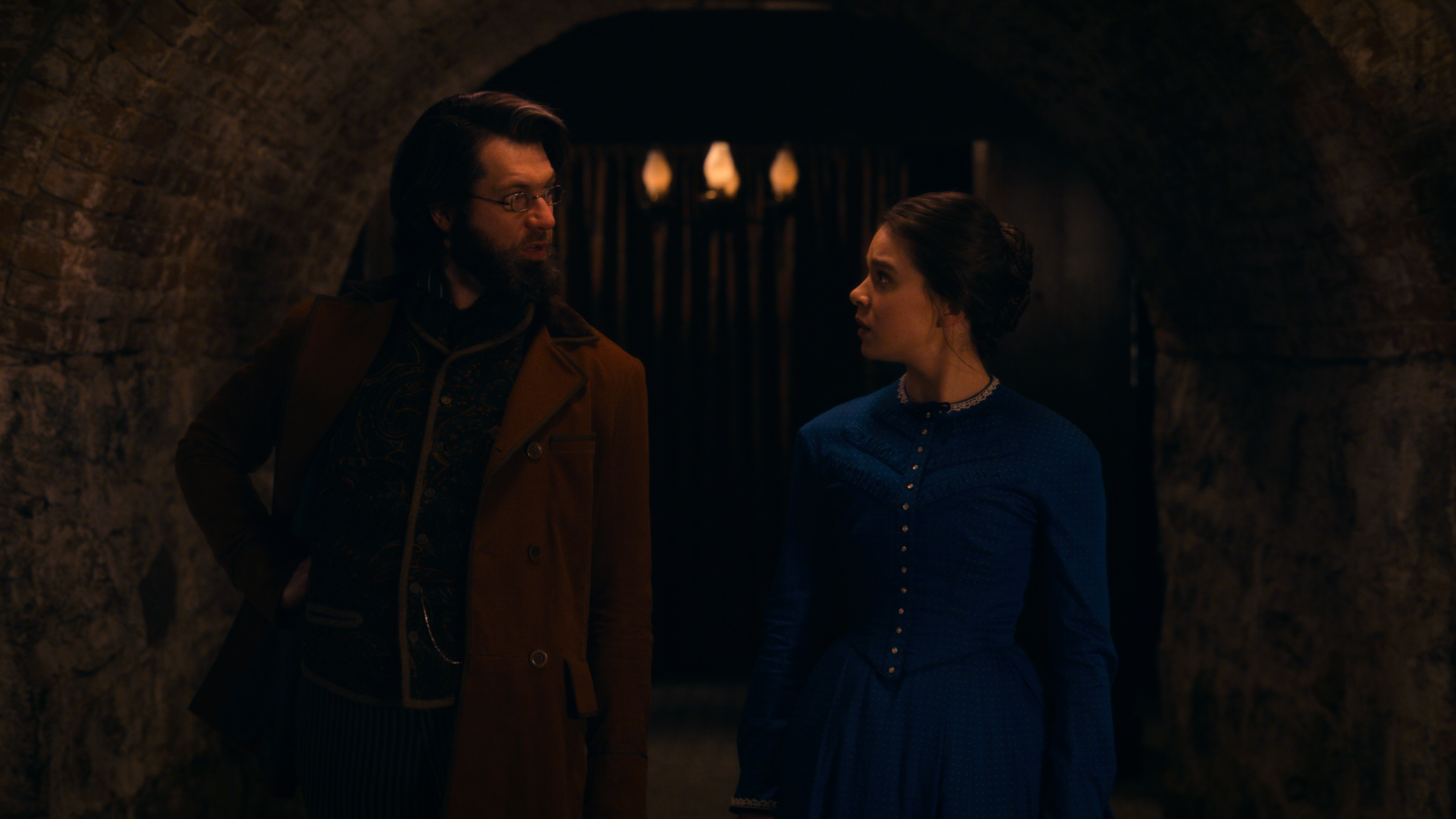
After encouragement from Walt, she shouts her love for Sue (Ella Hunt) from the rooftops before dancing the night away. She might not have all the answers when it comes to the fractured state of her family (and the country), but she is finding joy in the misery. The episode closes with the title poem, in which Emily sends a message to the world that has not communicated with her. While that doesn’t sound particularly optimistic in the context of the series, Emily is reaching out to a broader vision she hasn’t always engaged with. When she returns from her Leaves of Grass journey, will she pursue her love of Sue?
If anyone could do with an escape it is Sue, and a brief scene between the new parents underscores how fraught matters still are — even after the birth. A large number of gifts for the baby (who still doesn’t appear to have a name) are not enough to paper over the cracks and Sue is frustrated with Austin’s (Adrian Blake Enscoe) attempts to bond with the baby while he is sleeping. His singing is a sweet gesture dampened by what Sue believes is an inebriated state and his inability to understand the baby's sleep schedule. She somewhat cruelly says "I hope our child doesn't inherit all your traits." Although she cannot be blamed for this jab after his behavior over the course of the recent episodes.
Austin wants to be a good father and we have seen how natural the oldest Dickinson sibling is with babies, but Sue thinks “good fathers just stay out of the way.” It is a heartbreaking conversation between two people who don’t know how to communicate with each other and it feels like it is only going to get worse before it gets better. Even the people living next door to each other (or even in the same house) cannot get the words right and it is only in fantasies that dancing makes sense.
Emma Fraser spends most of her time writing about TV, fashion, and costume design; Dana Scully is the reason she loves a pantsuit. Words can also be found at Vulture, Elle, Primetimer, Collider, Little White Lies, Observer, and Girls on Tops. Emma has a Master’s in Film and Television, started a (defunct) blog that mainly focused on Mad Men in 2010, and has been getting paid to write about TV since 2015. It goes back way further as she got her big start making observations in her diary about My So-Called Life’s Angela Chase (and her style) at 14.
